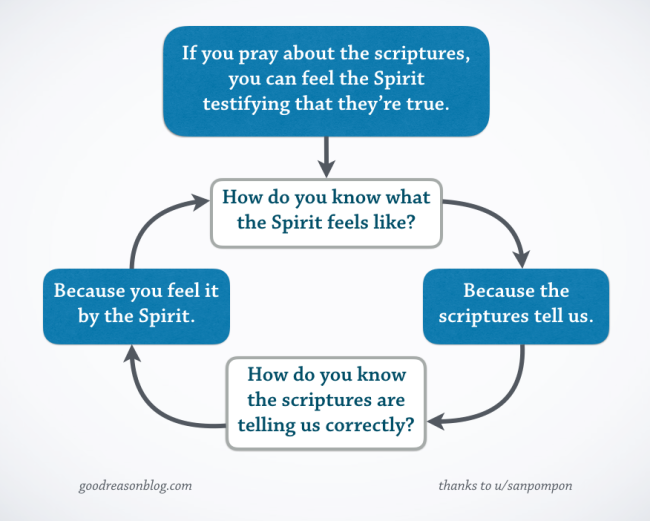
Good Reason
It's okay to be wrong. It's not okay to stay wrong.
Category: atheism (page 1 of 17)
It was Orientation Day at UWA. Clubs (like the UWA Atheist and Skeptic Society) set up booths and attract members. So do churches.
It’s not my idea. I think I saw it here first.
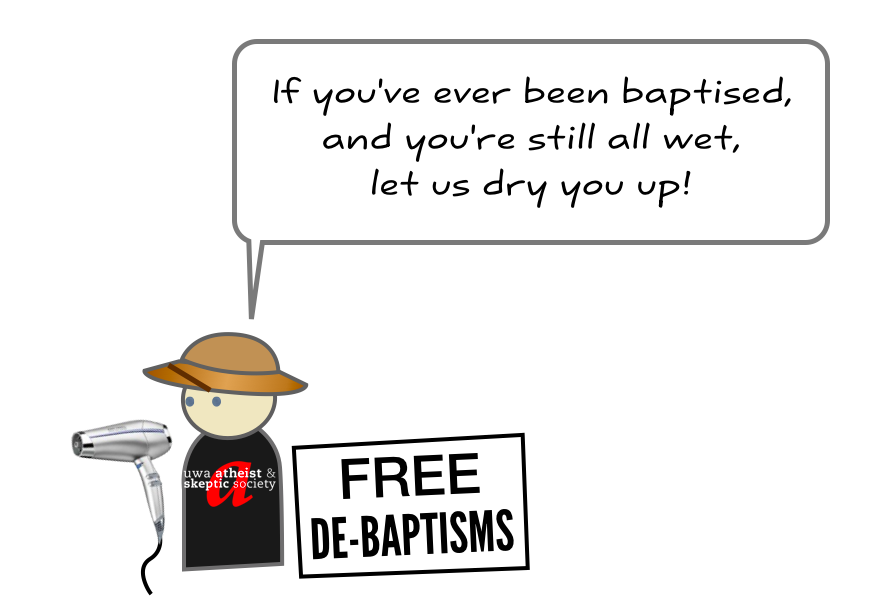
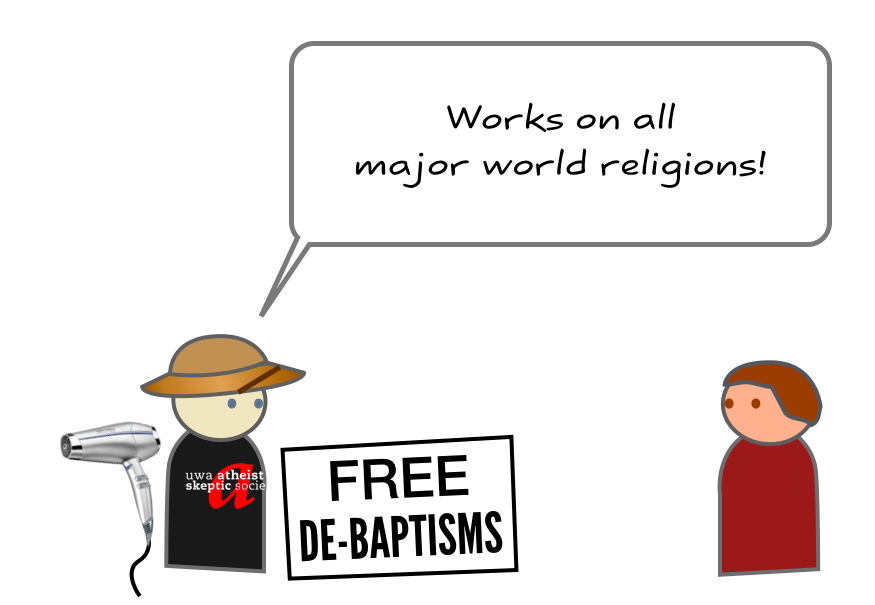
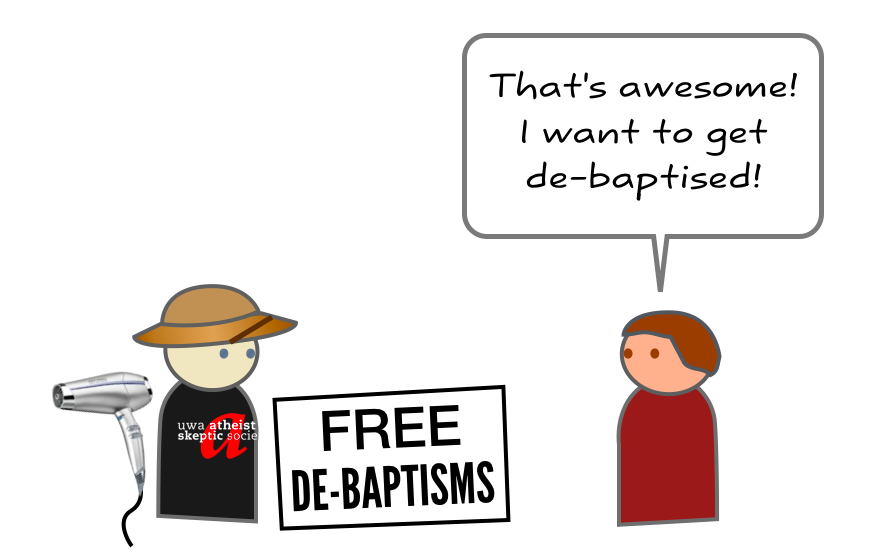
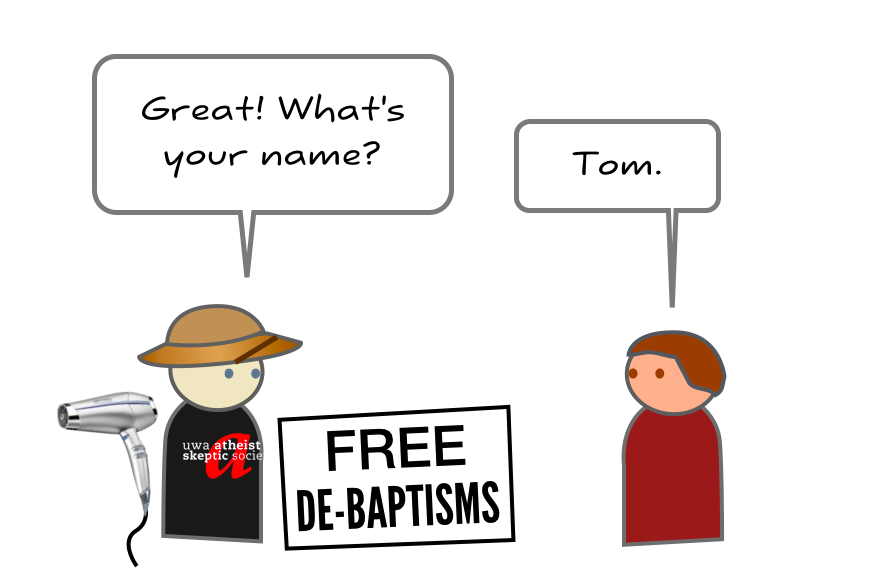
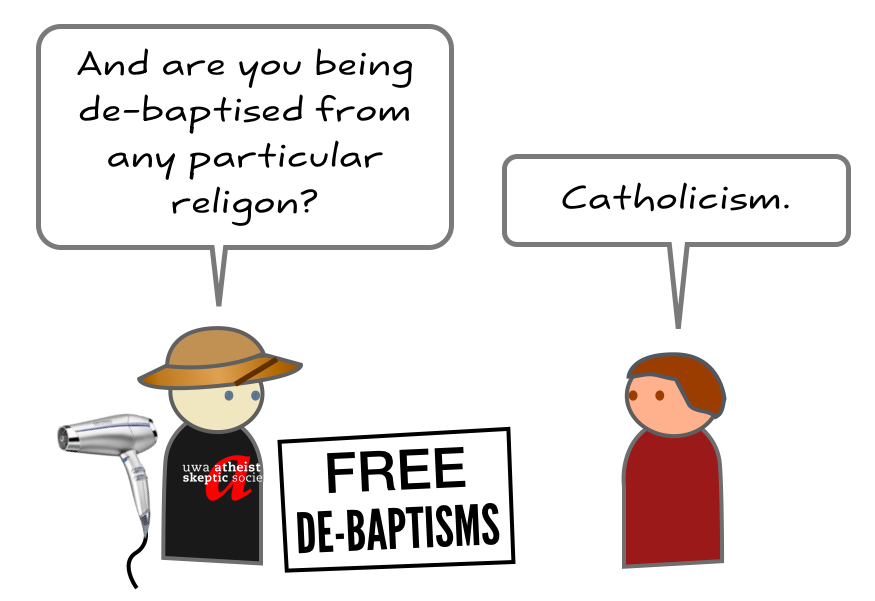
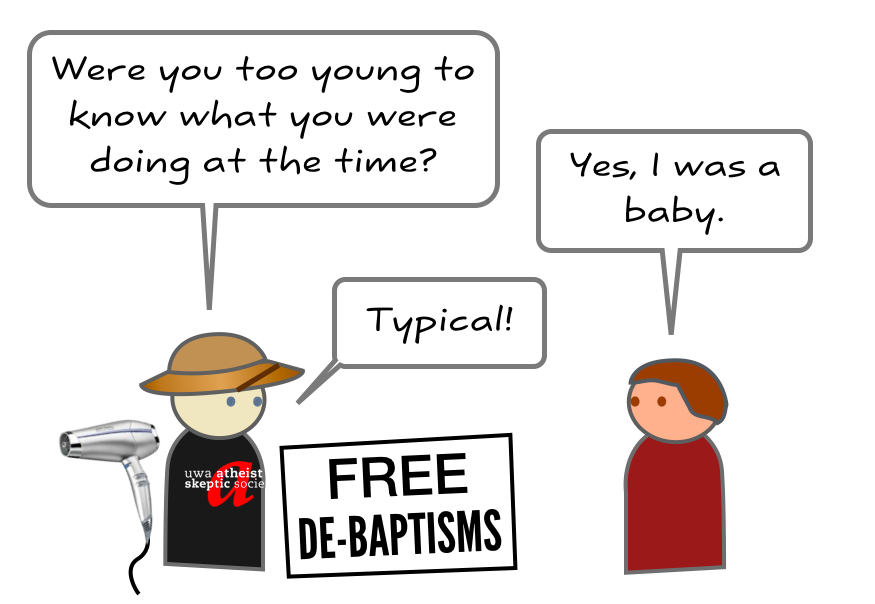
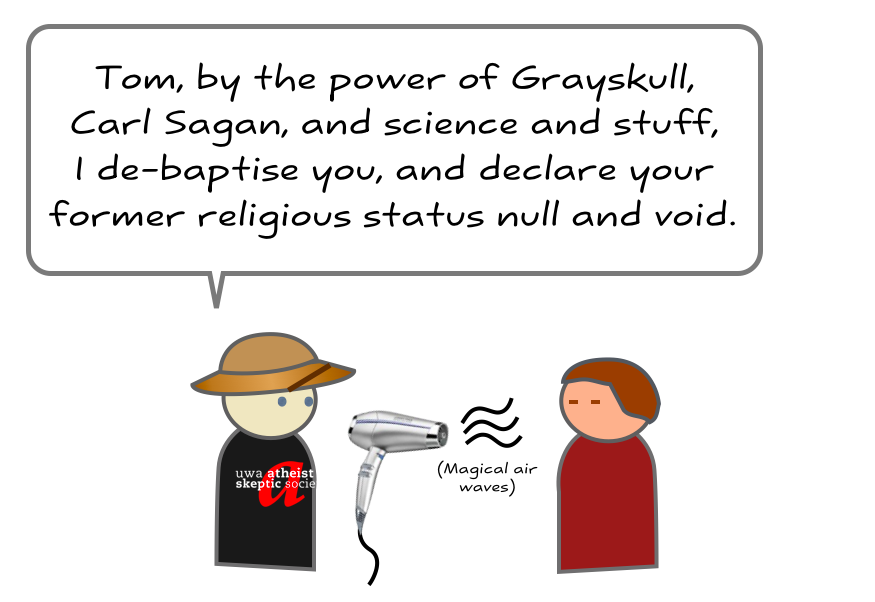

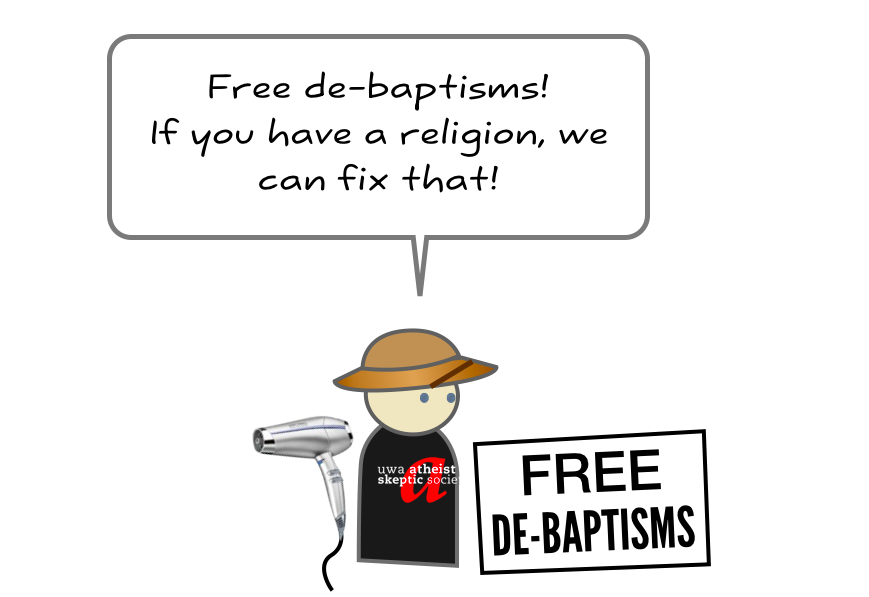

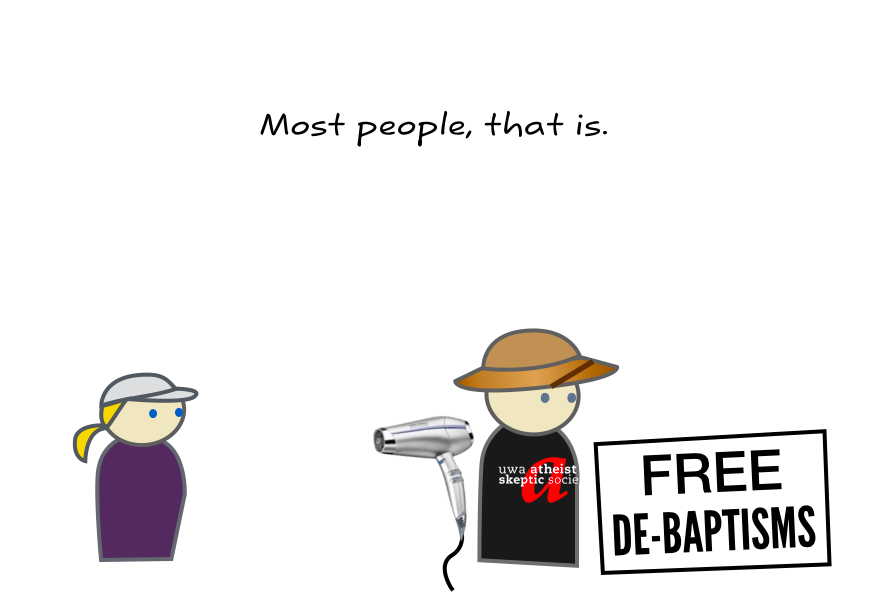
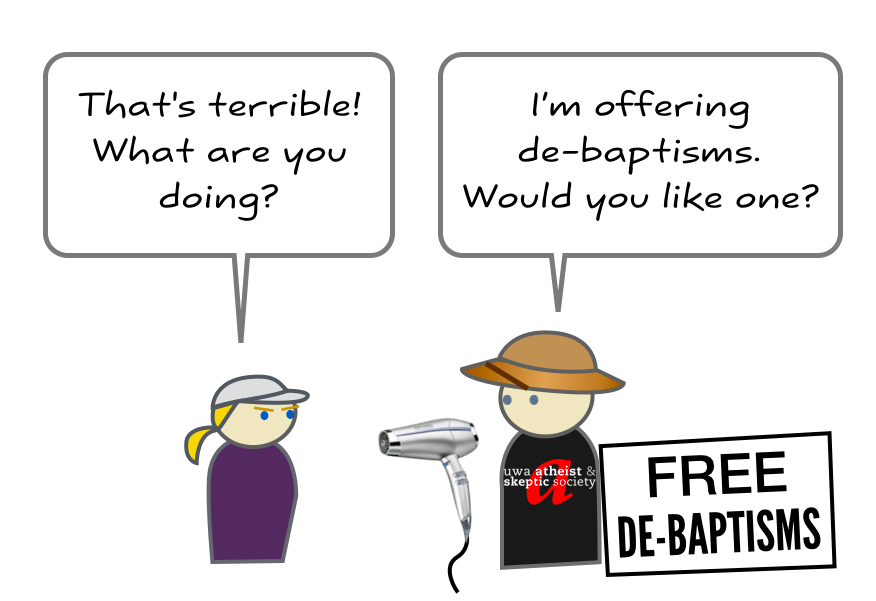
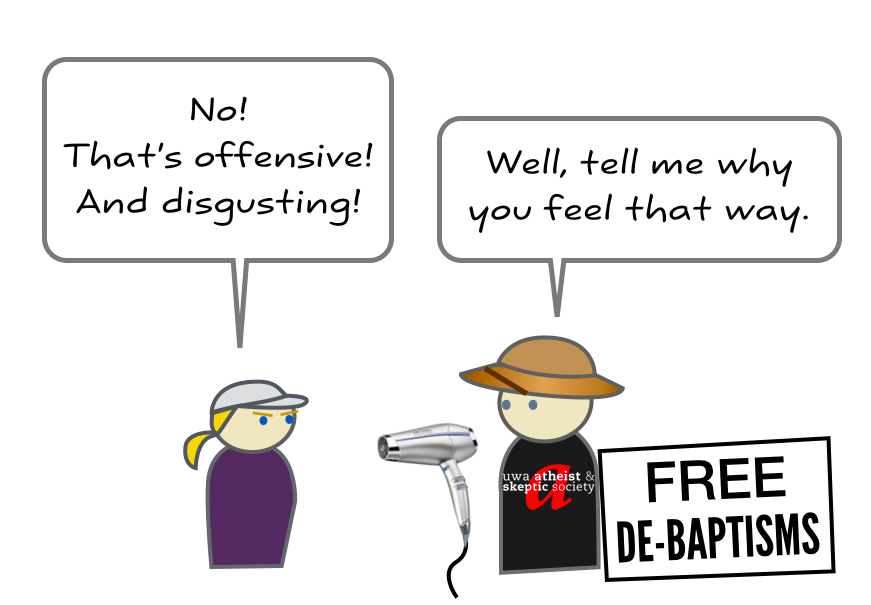
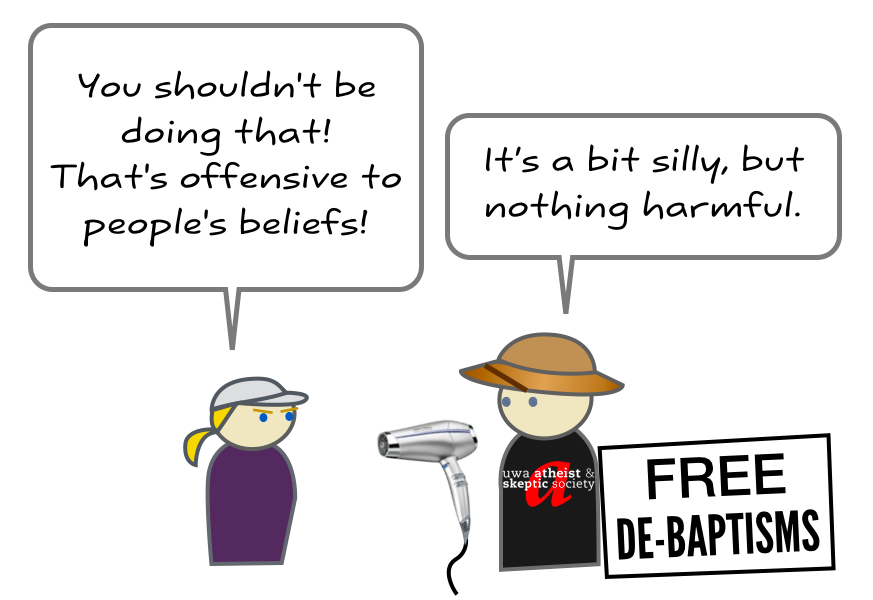
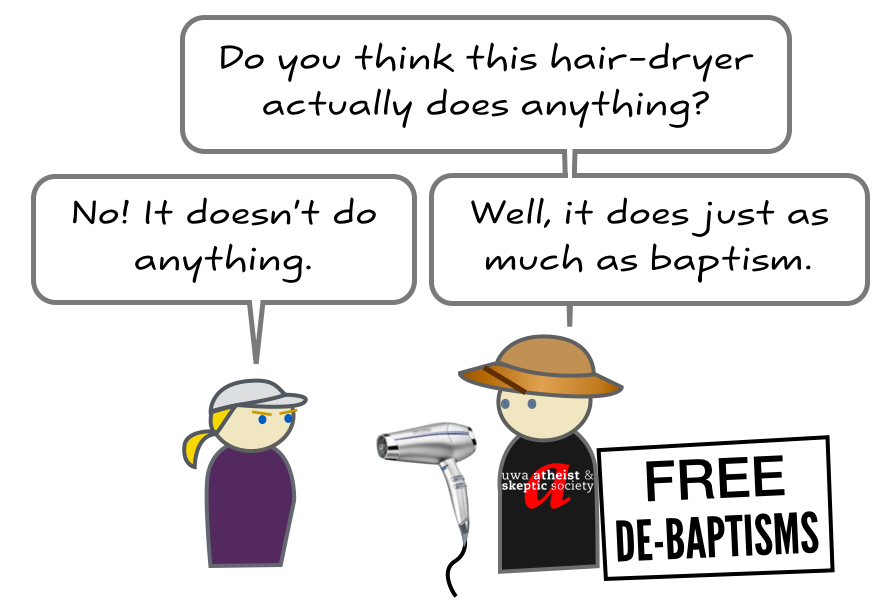
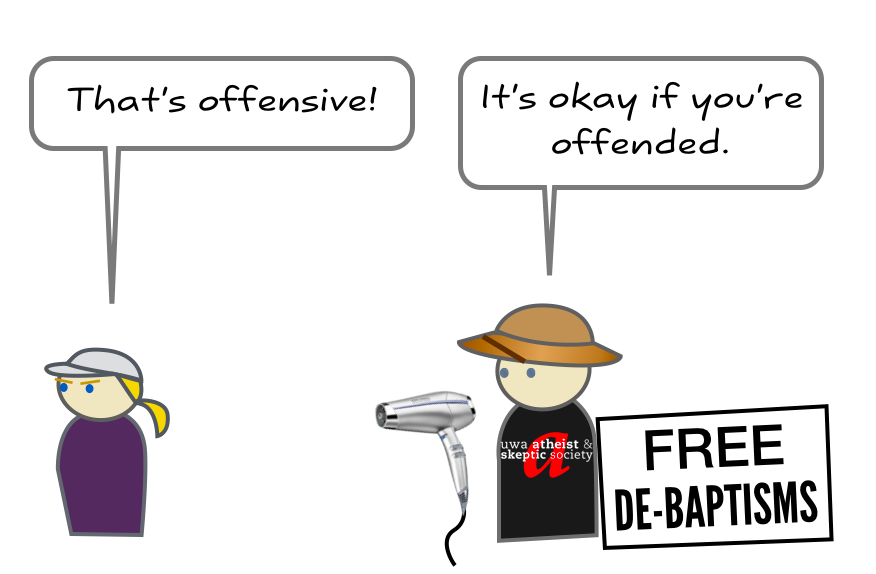
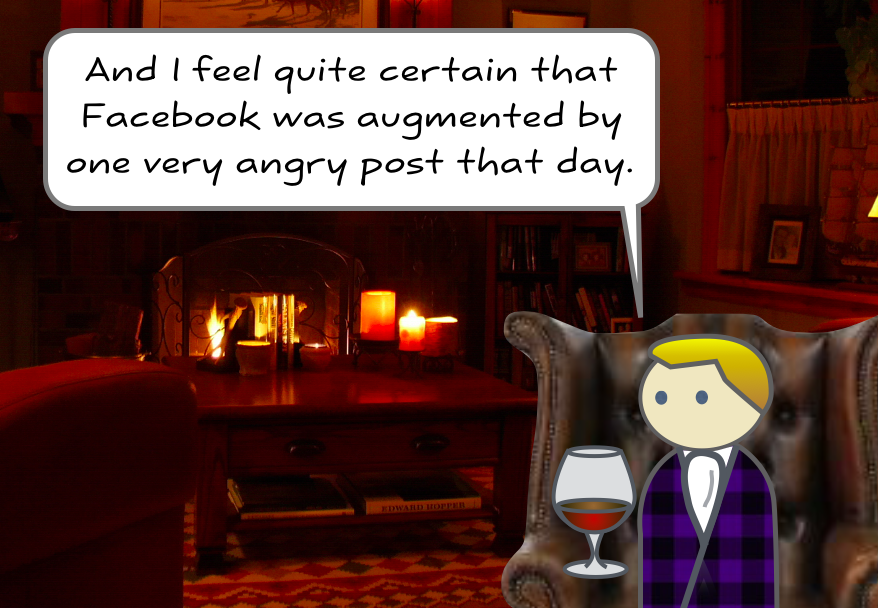
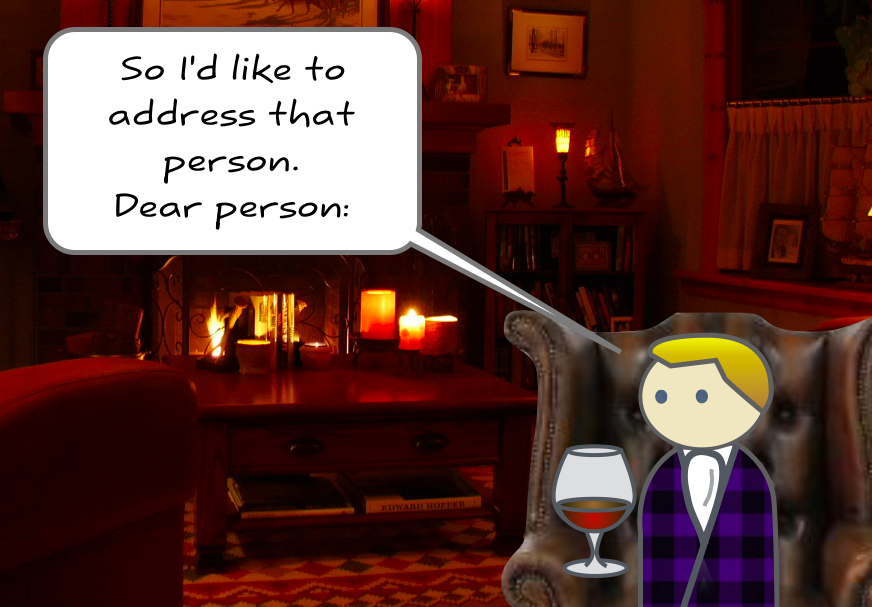
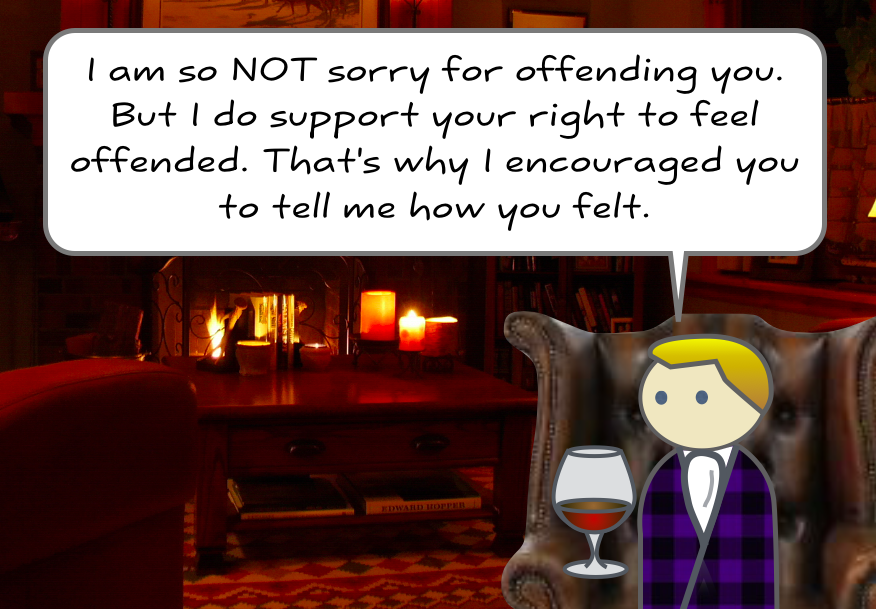
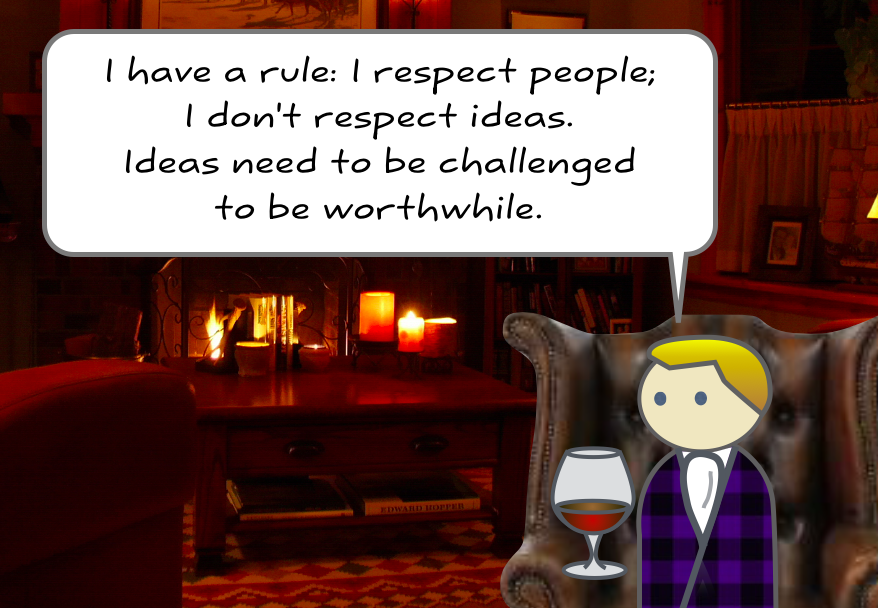
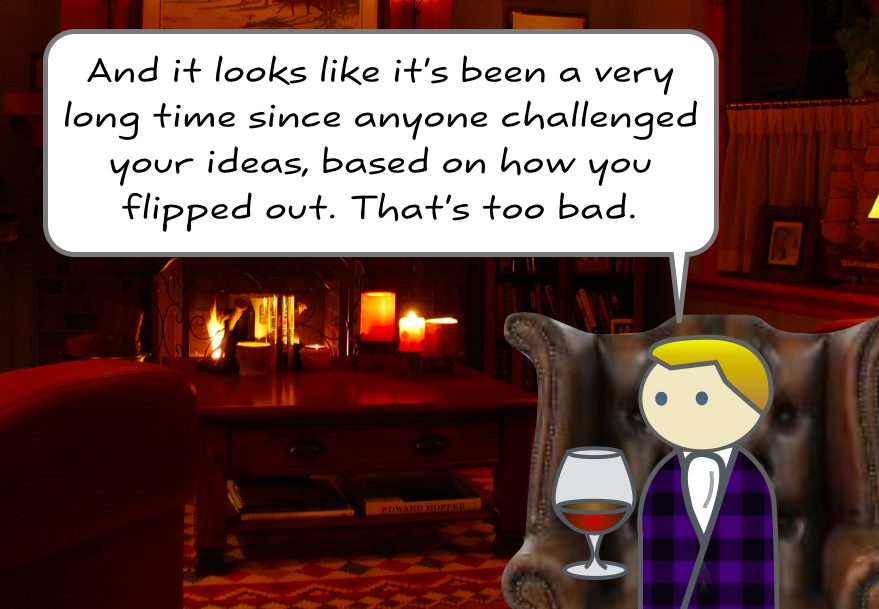
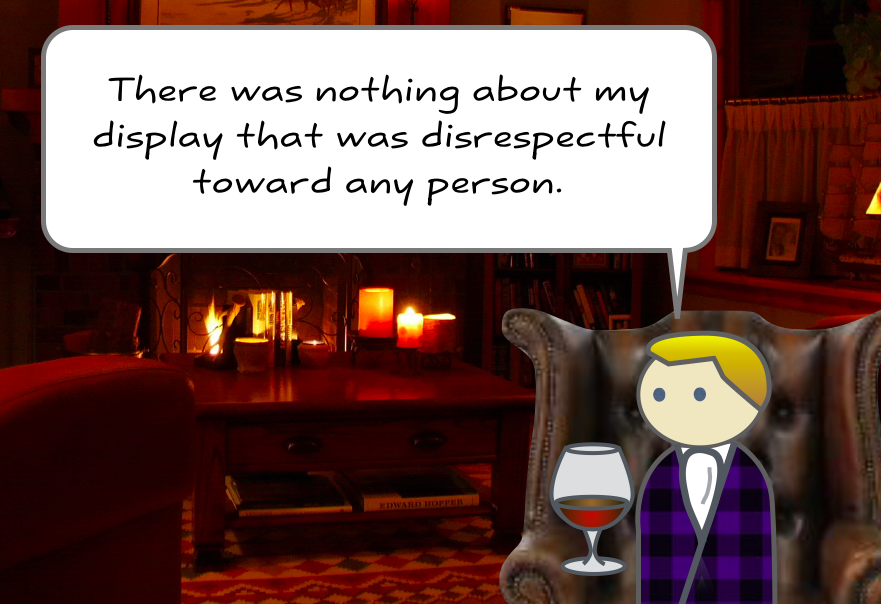
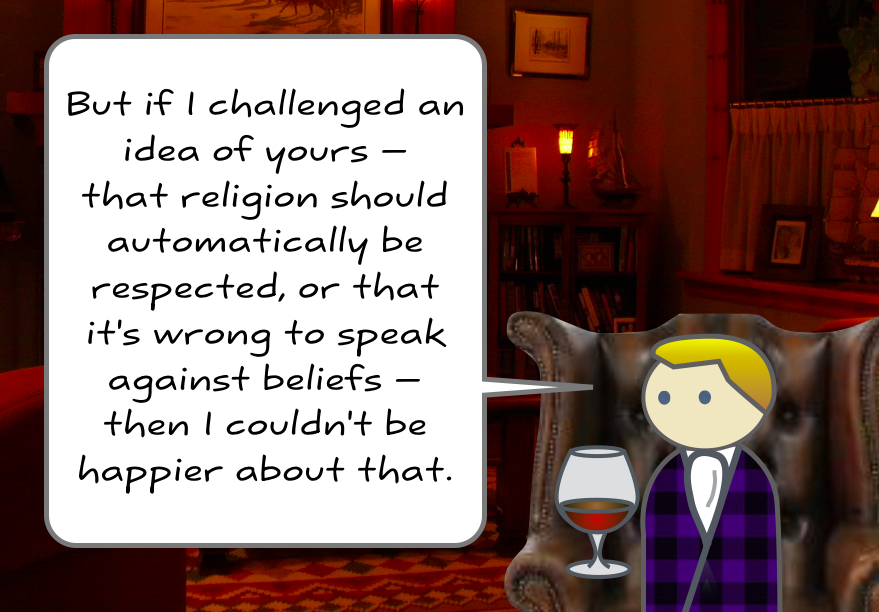
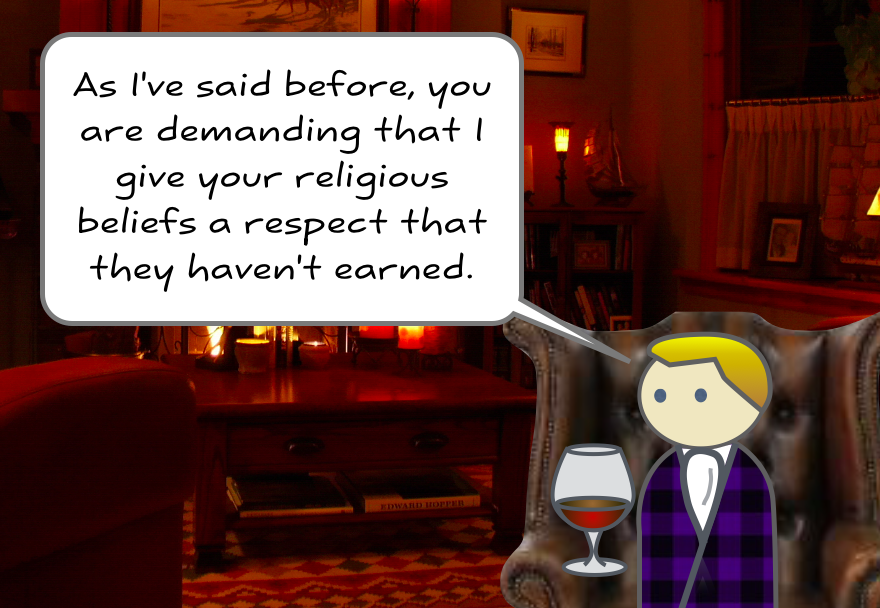
Where did I say that? Oh, yes: here. Why are atheists so rude?
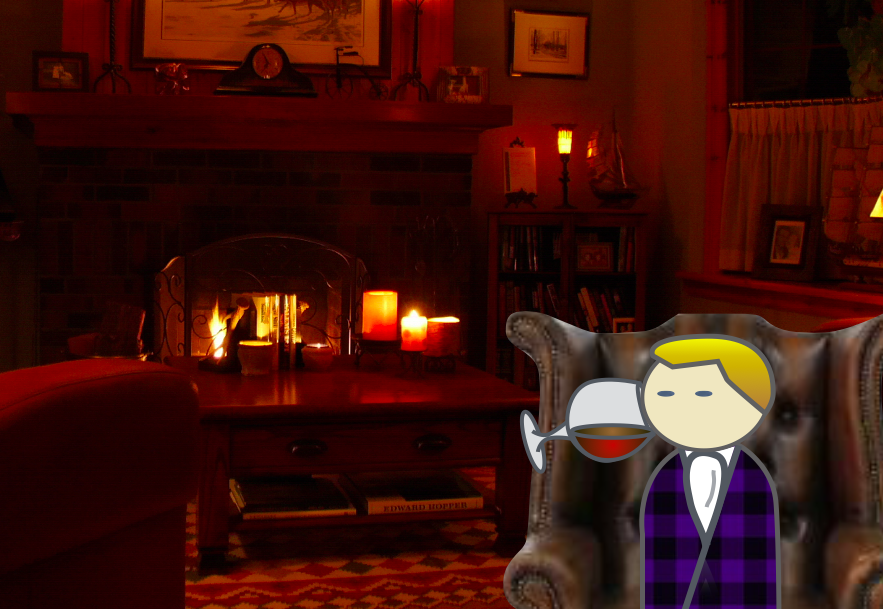
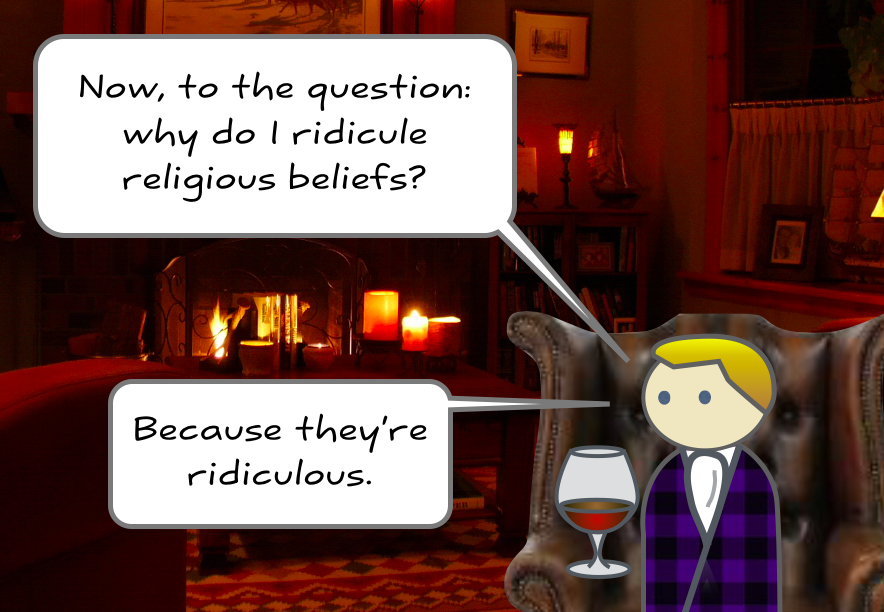
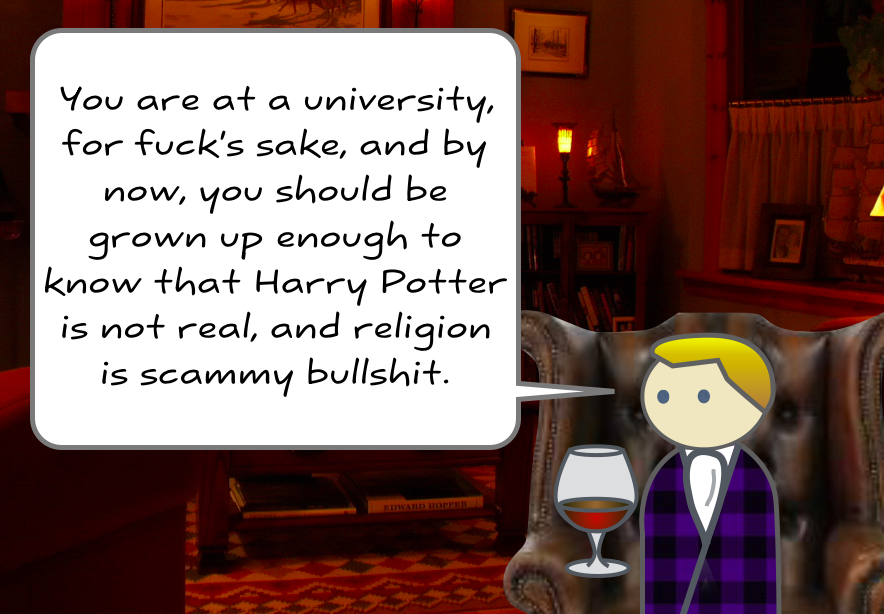
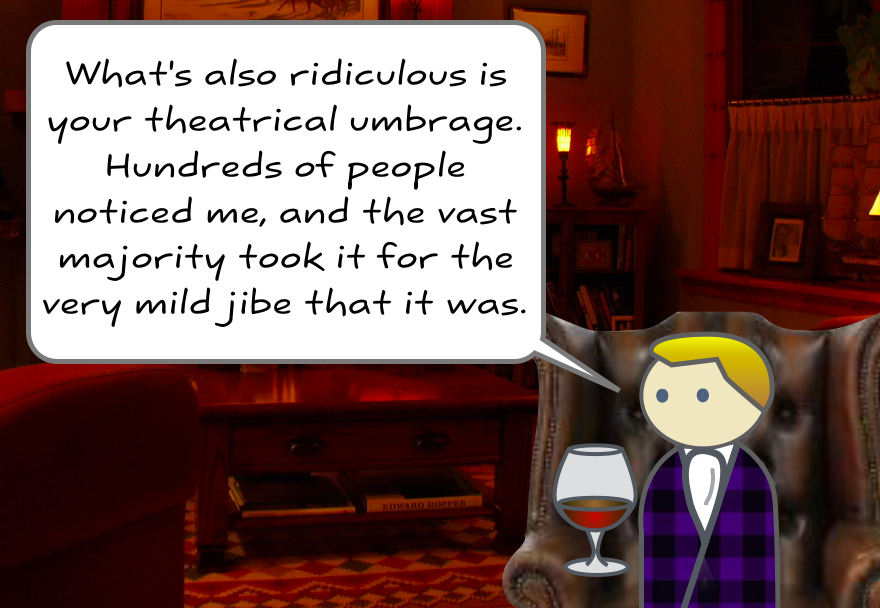



Click for larger images. Or put your favourites in comments.
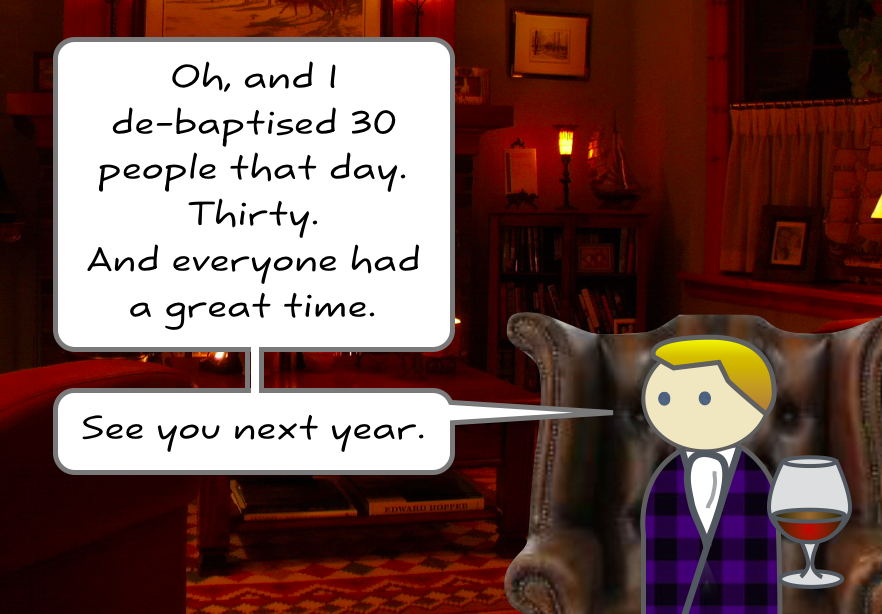
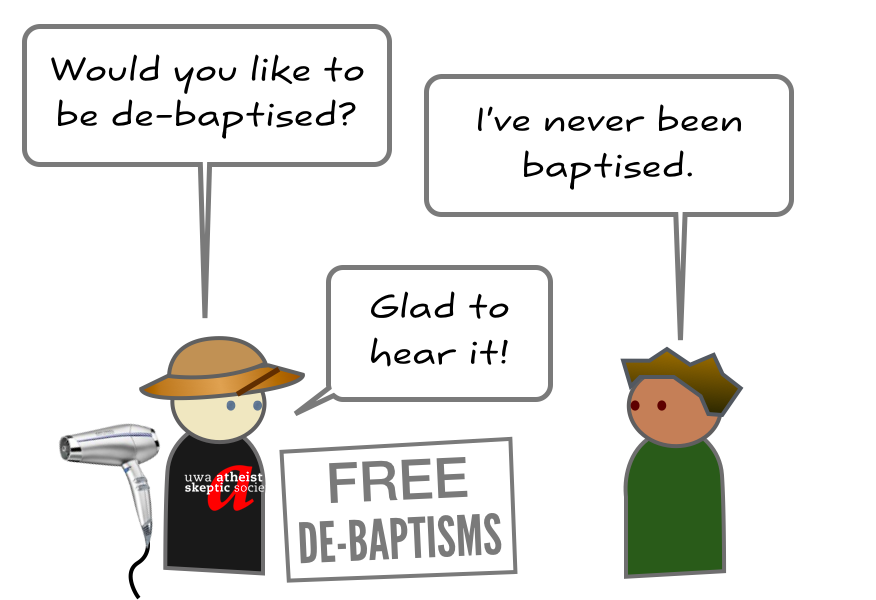
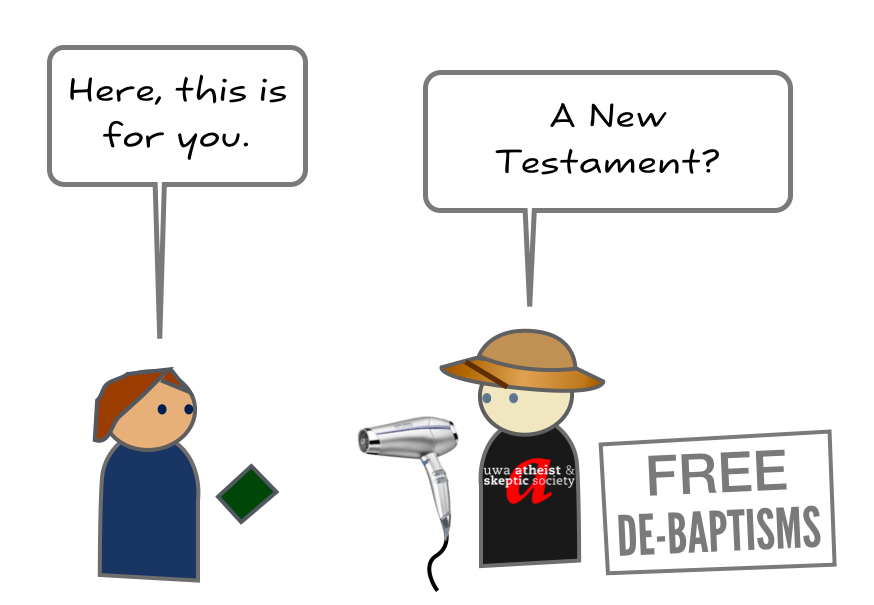
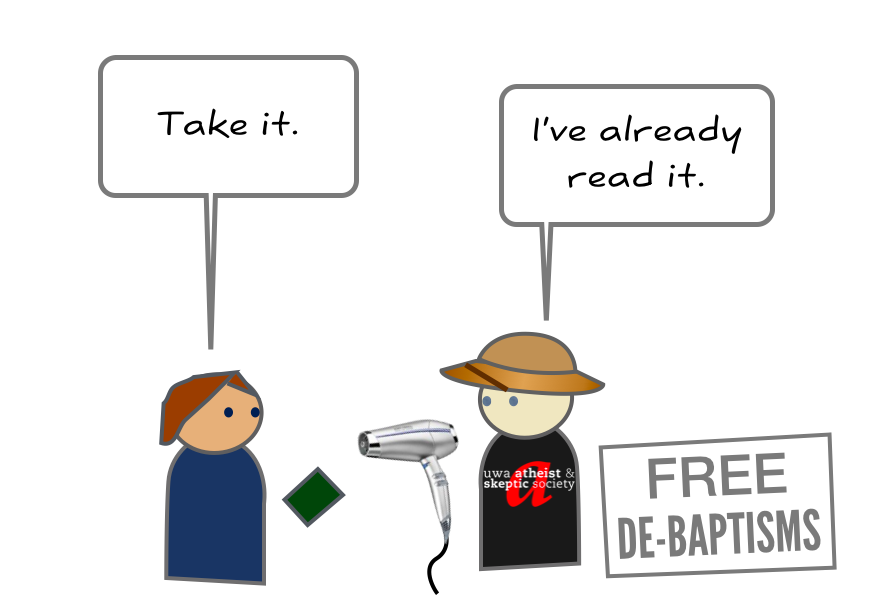
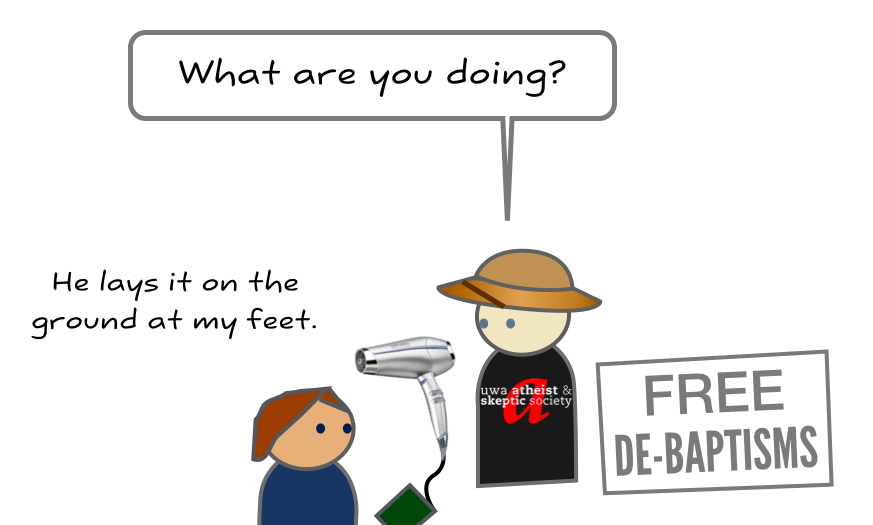
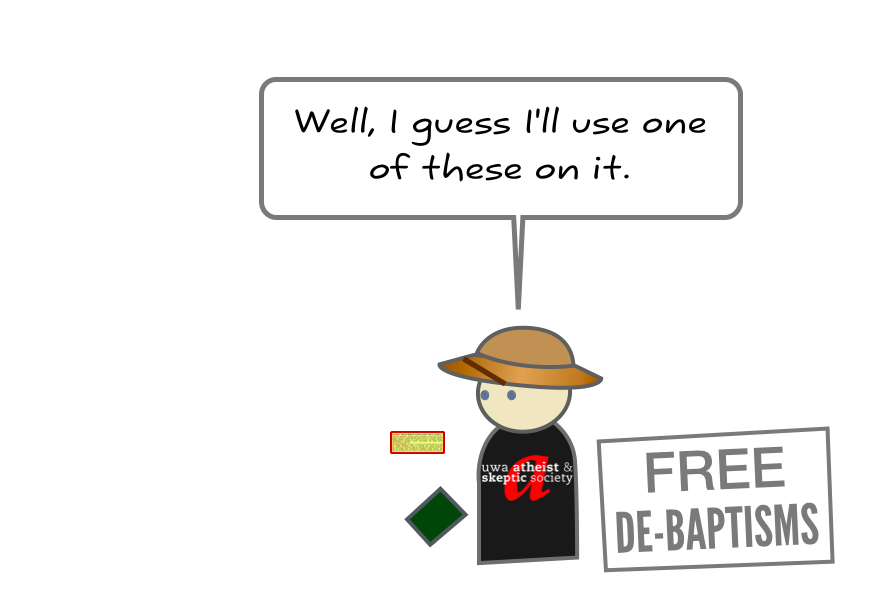

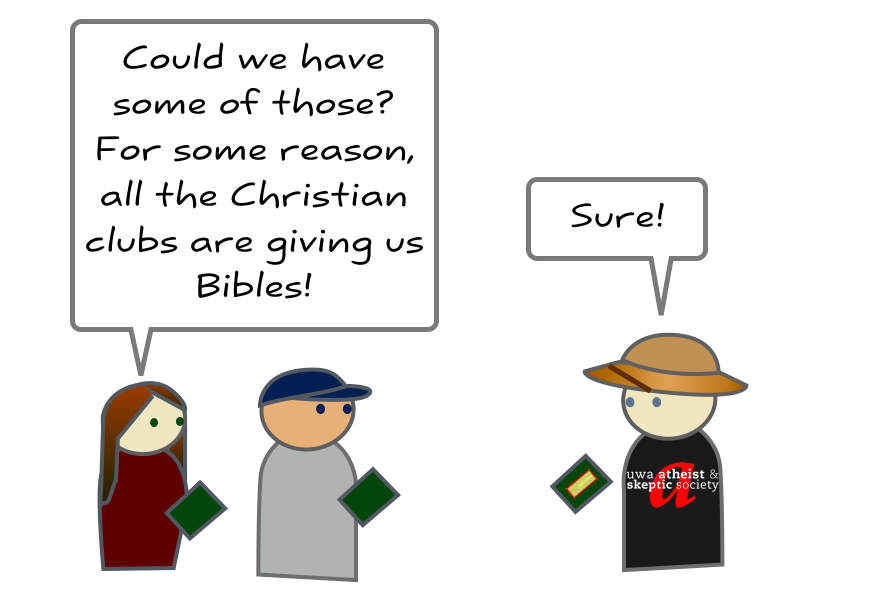
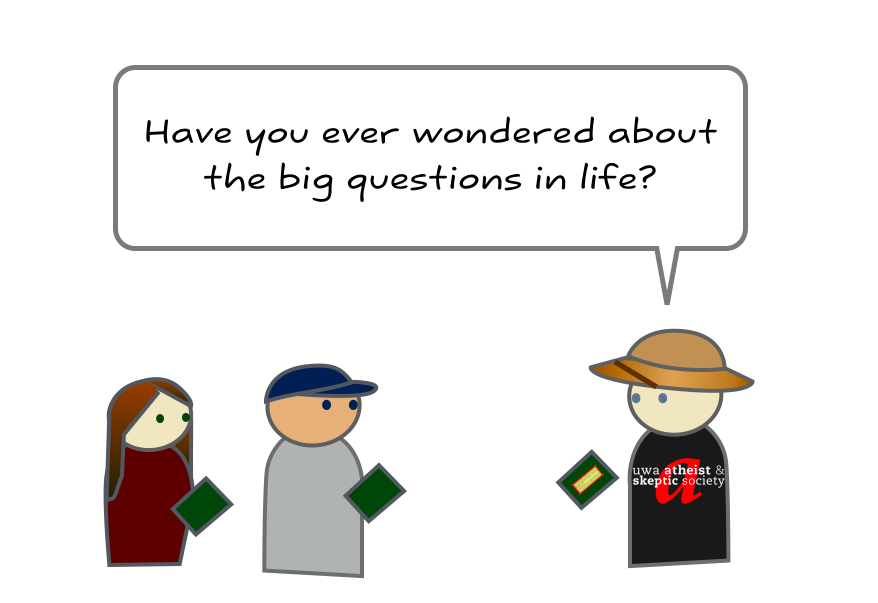
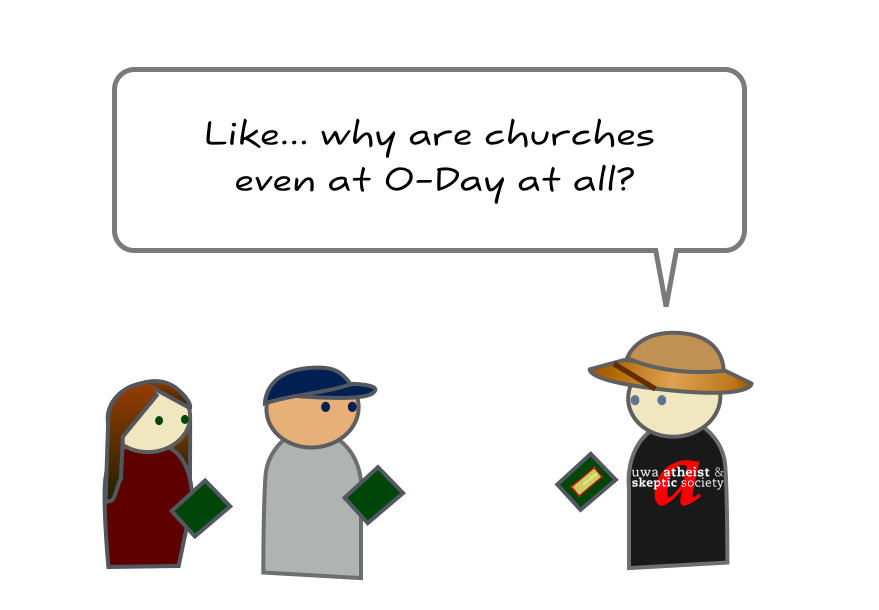
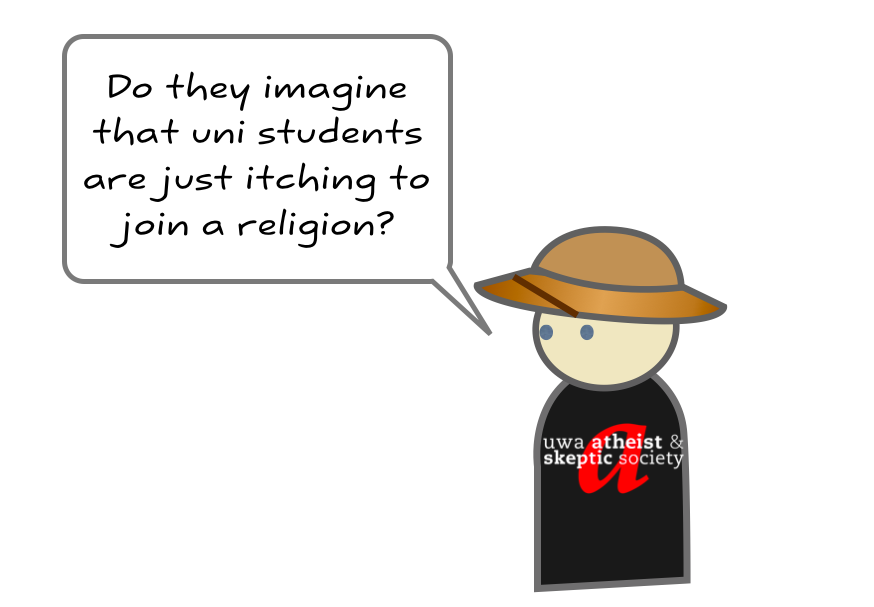
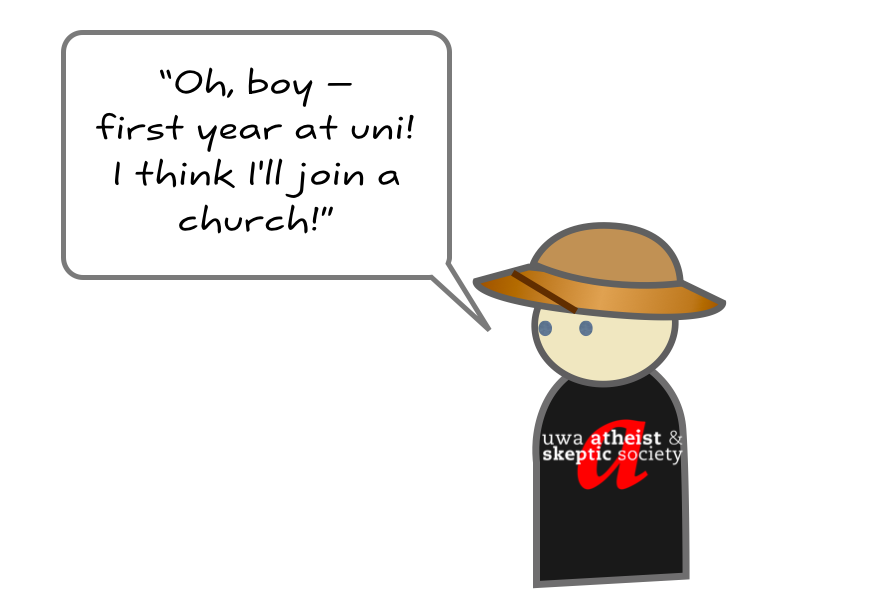
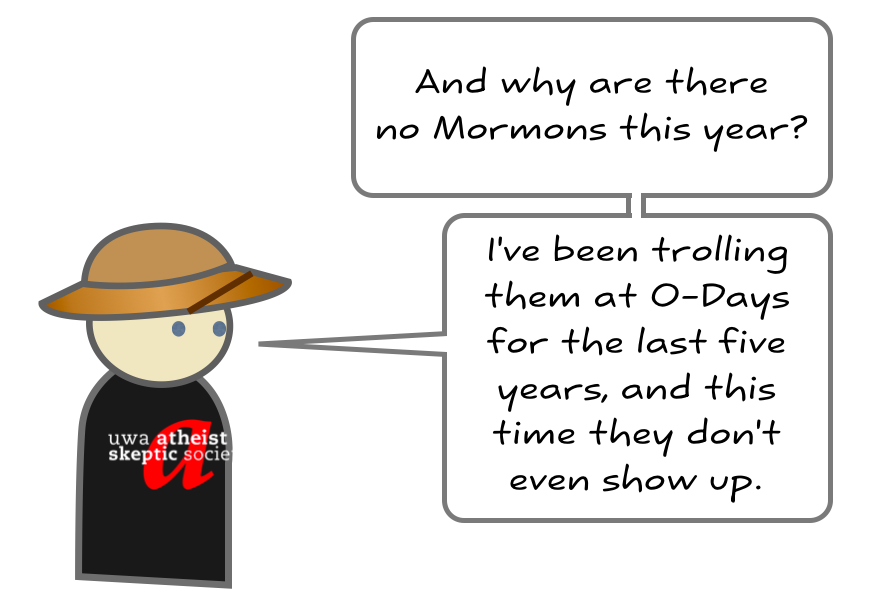
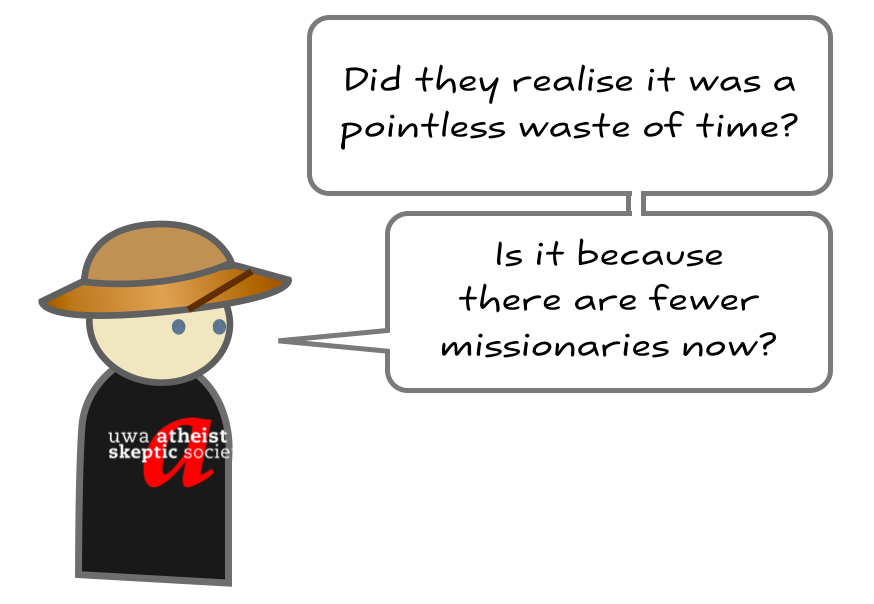
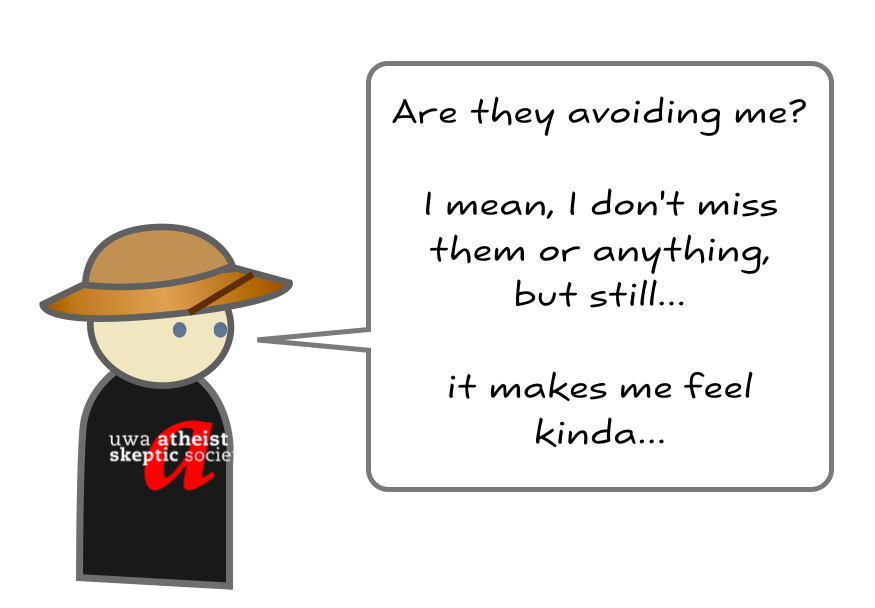


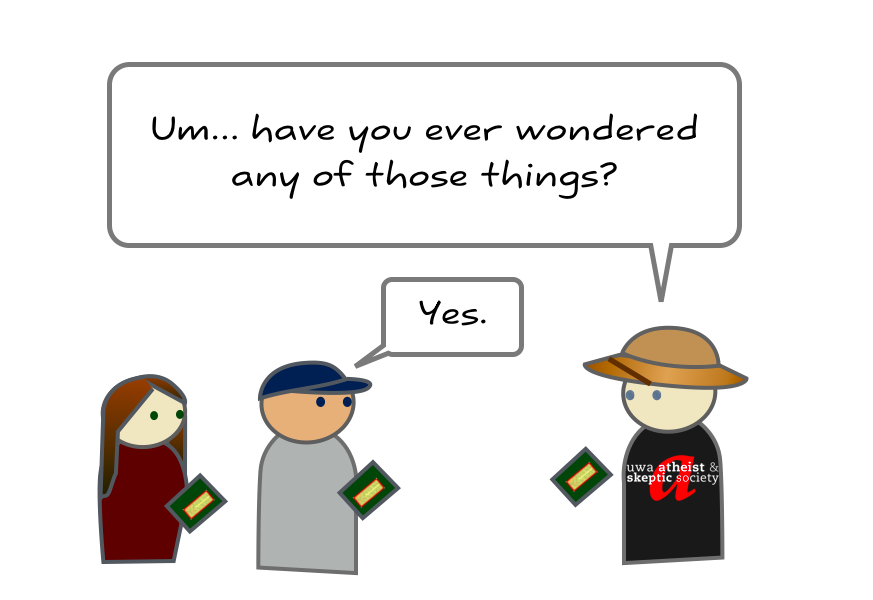
I’m sure I’ve mentioned before: I always engage with street evangelists. If they’re putting their ideas out there in public, those ideas are fair game for discussion and ruthless examination.
Here’s a discussion I had with a Witness of Jehovah. It went pretty much exactly like this. Feel free to use and adapt.
There are loads of problems here. Human evolution and human civilisation go back way farther than 6,000 years. But it’s a mistake to get bogged down here. Keep it moving.
Sin is a problem of God’s own making. He decided that he couldn’t stand some things. Then, having created the problem of sin, he decided to blame humans for the problem that he created.
Another problem: Jesus came back to life. You don’t get the ransom back! How is that a sacrifice?
Yet another problem: If God wanted a sacrifice, then he got one; he should be satisfied, and the process should be over. But it’s not; God expects us to believe in him. When someone pays a ransom, the kidnapper doesn’t then require the parents to ‘believe’ in him.
This is problem of its own; isn’t justice simply what God says is just? in which case he could do anything, and then declare his actions just by fiat. On the other hand, if there’s some external principle of justice that even God has to obey, then he must be subordinate to some principle. Then why worship God at all? Why not skip the middleman, and worship the principle instead, since it’s higher than God is?
This is a dodge to terminate the thought process. You could say any wild thing, and then refuse to defend it on the grounds that humans can’t understand it.
And again, why did God decide to make a solution that makes no sense? If humans need to believe this to be saved, then it needs to make sense to humans.
I think we can understand it. God is a bloodthirsty maniac whose ultimate idea of compassion is a human sacrifice. And he’s that way because he was imagined up by bloodthirsty people. That’s not hard to understand.
– – – – – – – – – – – – – – – – –
Thanks for stopping by! If you like this cartoon, I got more.
A god could have prevented all these things. So why didn’t he?
Actually, one believer told me that earthquakes were our fault. When I asked him why, he said it was because we destroyed paradise. Now I can be a little careless sometimes, but I don’t recall doing any such thing.
I recently got the chance to speak with Scott Hutchison in an interview for RTRfm. He’s the frontman for the acclaimed Scottish indie band Frightened Rabbit.
I’d noticed that some of their songs discuss atheism, most recently the song ‘Late March, Death March’ from the album Pedestrian Verse, with its lyric “There isn’t a god, so I’ll save my breath” and “So unfurrow that brow, and plant those seeds of doubt.”
So I decided to ask Scott about it. This part didn’t make it into the interview, so here it is.
Your browser does not support the audio element. Upgrade your browser to one that does
Link to file, if the player isn’t working.
If you’d like to hear the rest of the interview, it’s on the RTRfm website.
I’ve just rewatched this snippet of a debate between the atheist Christopher Hitchens and the conspiracy theorist Dinesh D’Souza.
Transcript
Now the argument really comes down to this: the absence of evidence is evidence of absence. In other words, if we don’t know about something we should believe it doesn’t exist. I want to suggest why this is actually an unscientific and very foolish way to think.
We can sort of see it by stepping outside the debate and applying it to some other issue. Let’s consider a simple question that’s a very relevant question today: is there life on other planets? And the answer is: we’re not sure. We don’t know.
Along comes the atheist, who says the absence of evidence is evidence of absence. We have not found life on other planets, so there’s no evidence. Therefore, there is no life on other planets.
Is this an intelligent position? No, it is stupid and premature. Why? Because we may not know how to look. It may be that there is — So the fact that there is no evidence is evidence of nothing! It may be evidence of the poverty of our imagination, the ineffectiveness of our instruments. The bottom line of it ultimately is when we look at the evidence we find the religious believers are right. Thank you very much.
This is a wonderful analogy! But not for the reasons D’Souza thinks it is.
If the god debate were transplanted to the domain of extra-terrestrials, here’s how it would play out.
The atheist — or should I say ‘an-alienist’? — would say, “We can’t prove that aliens don’t exist. But no one has ever shown convincing evidence of their existence, so until we get some, there’s no reason to believe in them. Of course, I’ll change my mind if more evidence becomes available.”
On the other hand, the alien-believer would say, “I know that aliens are real! I know this because I’ve had a personal experience with them. It’s really more of a relationship.
“They left a book which tells all about them. And I am so certain that my understanding of this book is correct that I am prepared to persecute and wage war with other alien-believers whose understanding of the aliens differs slightly from my own.”
Would you believe this person? Or would you simply feel pity for them, and end the conversation as soon as you could?
It’s fine to entertain the notion — even the hope — that life exists on other planets. But to be as certain of it as theists are of god begins to look like madness, and we should recognise both as such.
There’s another similarity between god and aliens. They’re both what Robert Sheaffer calls ‘jealous phenomena‘ — they show a preoccupation with not being discovered by humans, which makes it convenient for their respective apologists. They also both tend to appear to people when they’re alone.
I don’t think it was very smart of D’Souza to push this the god/aliens comparison, but I’m glad he did. It’s one of the few times he’s said something useful.
I occasionally run into atheists and (more often) agnostics who say “Atheism doesn’t provide a sense of community. How are we providing a sense of community?”
Well, I was part of the Mormon community for 38 years, and let me tell you: Community sucks.
No, seriously, it’s way over-rated. If I’ve learned one thing from my Mormon days, it’s that just believing the same thing as someone else is not a very good indicator of whether you’ll get along in other ways. And my experience with other atheists has not done much to contradict this. There’s only so many times you can say ‘Yep, Sagan/Minchin/Dawkins/Doctor Who is awesome.’ Maybe it’s just not something I need, or I can get it from online communities, or something. Also, I’m afraid of echo chambers.
Mind you, I’m lucky. I have a great bunch of people online and off that I get my people needs from, and some people don’t. And some people just groove on having a community, and we need a multiplicity of approaches in atheism anyway, so I was not entirely displeased to learn that the Sunday Assembly was coming to Perth. It’s the project dreamed up by a couple of UK comedians, Sanderson Jones and Pippa Evans. They’re on a ‘Forty Dates and Forty Nights’ tour, getting Sunday Assemblies started in major cities around the world. Apparently there’s a bit of comedy, games, and some rock music. Oh, and community. So… it’s like a born-again church? Ew.
Some people haven’t been as keen on the idea of Sunday Assembly, and I understand why. After you’ve had your millionth boneheaded ‘atheism is not a religion’ conversation, now here comes Atheist Church! Oh, great. But don’t be like that — let’s come on down to mingle with the godless and see what it’s about.
We’re in a lecture theatre at UWA, 150 of us, including some children, clapping and bouncing around, singing “Walking On Sunshine”. Yes, that is as daggy as it sounds. But Sanderson is here leading the singing, and he’s so enthusiastic and boisterous that I don’t mind playing along for a little while. Is this what happens at charismatic churches? It seems like it — there’s a reading just like at church, there’s Sanderson being the likeable and wise-cracking leader figure just like at church. Oh, and there’s a collection just like at church. It cost the UWA Atheist and Skeptic Society a bit to hire the venue, and some of the money will also go toward the next meeting. One thing I don’t think they do at church is a game: Danish Clapping. Everyone pairs up with different people a few times, and I chat a bit with my game-partners between rounds. Next, a physicist explains a bit about the origin of the universe and the cosmic background radiation. It’s all light-hearted, kind of enjoyable, and certainly more fun than a dreary Mormon Sacrament Meeting.
Sanderson says Sunday Assembly wants to use all the good things about religion, but leave out the god bits. It reminds me of that approach to curing cancer that involves giving the patient AIDS (or sort of). Doctors take HIV, remove the part that destroys your immune system, and patch in something that kills cancer cells instead. Now imagine that we do the same thing with religion — take all the mechanisms that religion uses to help itself propagate, and then strip it of its toxic theistic payload. Done that way, atheist church would act as something like immunisation, since the churchy aspects of theism — whatever attraction that holds for some people — would have been safely co-opted. Or would this backfire, reifying the whole ‘church is fun’ concept? Not sure, but it seems to be a good imitation. I can’t really see anything here that would be out of place in a church meeting, except the conspicuous absence of anything to do with a god. There isn’t even any religion-bashing. Sanderson explains that they want to keep it positive, or as he says, “Nothing that would make my religious granny uncomfortable.” So maybe this would do for someone who likes the feeling that they get from church, and the exhortation to — as the Sunday Assembly motto has it — “live better, help often, wonder more”. Maybe people stumble into churches with those ideals and like what they find, whether they believe in a god or not. Sunday Assembly could offer that, but with no supernatural ingredients.
Sanderson leads us all in a moment of silence, and suggests that we think of what we have. What we have? I’m pretty lucky. I have a good job, a beautiful and loving wife, two smart and strong boys. My health and a home. Sometimes I think of my frustrations and disappointments, but here in the silence, they seem small compared to those of (say) people in the Philippines, hit by disaster. I feel a bit more grateful, and make a mental note to donate more to people who have lost everything.
The theme for today is ‘Impromptu’ because the whole thing has been arranged at the last minute. The venue was only arranged a couple of days ago. Sanderson is about to give a small talk on today’s theme, but he can’t think of anything relating to ‘Impromptu’. Someone in the audience helpfully suggests ‘Live in the moment!’ There it is; there’s his topic. And he speaks about being aware that we’re alive, and one day we’ll be dead and not able to be aware of anything. He gets us to clench up our fists — something he liked to do as a kid — and feel the tension spreading to our arms, shoulders and chest. Then we let it go. Aaaah — release and relaxation.
One more song — ‘Down Under’, of all things — and we’re done. Sanderson will have moved on by the next meeting in a month. Legend has it that he will return, perhaps in 2,000 years. In the meantime, it’s up to us to keep it going and he gives tips on the format to those who stay to form a committee.
I wouldn’t want Sunday Assembly to be the only way I get my atheism on, but it could be a part of this complete breakfast. I’d think about going again; I probably will go to the next one, though I might not get evangelical about it. It may not be to the taste of all atheists.
Tell you what, though. I saw someone there that I knew. He’s a guy who’s attended lots of churches for a long while, tried to be a Christian; he’s sort of a seeker. I said hi, and asked him what made him want to attend. His response, paraphrased, was “Well, I like going to church, but I no longer think there’s a god. I realised that what I needed in my life was more positivity and joy. So that’s what I’m here for.” (I asked if I could share that here in this post, and he said that was fine.)
More positivity and joy. Couldn’t we all use some of that? So I don’t begrudge the concept. If it takes off in Perth, I’d say that’s what he’d be likely to find at a Sunday Assembly.
Hemant Mehta the Friendly Atheist was asked a very interesting question. It’s in this video of him with a friendly Christian pastor.
The moment is at 24:15.
Pastor: Is there anything — anything — that might change your mind?
Mehta: I don’t think at this point anything that anyone tells me, because they usually tell me stories about how they came to God, how they came to Christ. It’s like, “Well, that’s nice for you. Unless I have that same experience myself, unless I experience a miracle that I can’t explain, unless something happens to me, I really don’t think I’m going to hear anything that will change my mind.
Pastor: That’s interesting, right? He’s saying if a miracle happens.
You can almost hear the pastor thinking:
This isn’t a great answer for me. Just because there’s something I can’t explain, that wouldn’t be enough for me. I can’t explain lots of things. I’m not good at that sometimes. And a lack of explanation doesn’t automatically mean “theism” — that’s the Argument from Ignorance.
If you’re an atheist, how would you answer this question? It wouldn’t be very open-minded of you if you said “no”, now, would it? You want to seem convincible. On the other hand, as Mehta points out in the video, you haven’t been convinced by the same 49 arguments that you’ve heard year-in, year-out, so what new thing are believers going to come up with?
It’s all a bit moot for me; even if I were convinced that the god of the Bible existed, I’d still never worship him because he’d be a homophobic, misogynistic dickbag.
But if it were that pastor asking me, I’d say “Sure. Something could convince me.” And here it is.
If:
- there were some occurrence, happenstance, or phenomenon for which the only explanation were a theistic one, and
- that explanation were well-studied, and
- this were well-accepted by the scientific community,
then, yes, I would probably believe it.
And this is never going to happen. Theists haven’t done the work of defining their god in a way that makes him testable. They have no interest in doing so. Like naturopaths and chiropractors, they have enough customers to keep going without doing all that work to establish real credibility.
Which really means, no, nothing as it stands could convince me. But that’s not my problem.
I did all this thinking, only to realise that I’m echoing something PZ Myers was writing about years ago. But that’s okay — if believers can come back with the same arguments time after time, then the answers will have to come back around, too.
Here’s some audio from a forum I was invited to be a part of at Wesley Church a little while ago. It’s between me and pastor Nigel Gordon, with Paul Whitfield doing a fine job as moderator.
It was called “Do we need forgiveness?“
My take: We don’t need forgiveness from a god. We need to get forgiveness from each other, and try to become more aware of the consequences of our actions. And if the god of the Bible is real, he needs to beg forgiveness from all of us.
One thing about this discussion has stayed with me: Nigel keeps comparing the debt of sin to the debt of money. But I don’t think sin is the same as money. When I sin, does a little pile of stuff appear somewhere, and it has to be taken away? Or is it something else? What is the form of this ‘sin’, and why does it need to be dealt with? And why would god killing himself accomplish this?
Why wouldn’t god just forgive everyone? Why would he need to (in Matt Dillahunty’s words) need to sacrifice himself to himself as a loophole for a rule that he created?
It’s all very arcane, and when I try and clarify this beyond the vague details, Christians talk in circles. It’s a metaphor that you could probably accept if you don’t think about it too deeply, but when you start to unpack it, it makes no sense. Yet this pile of mush is the very heart of Christianity.
© 2026 Good Reason
Theme by Anders Noren — Up ↑
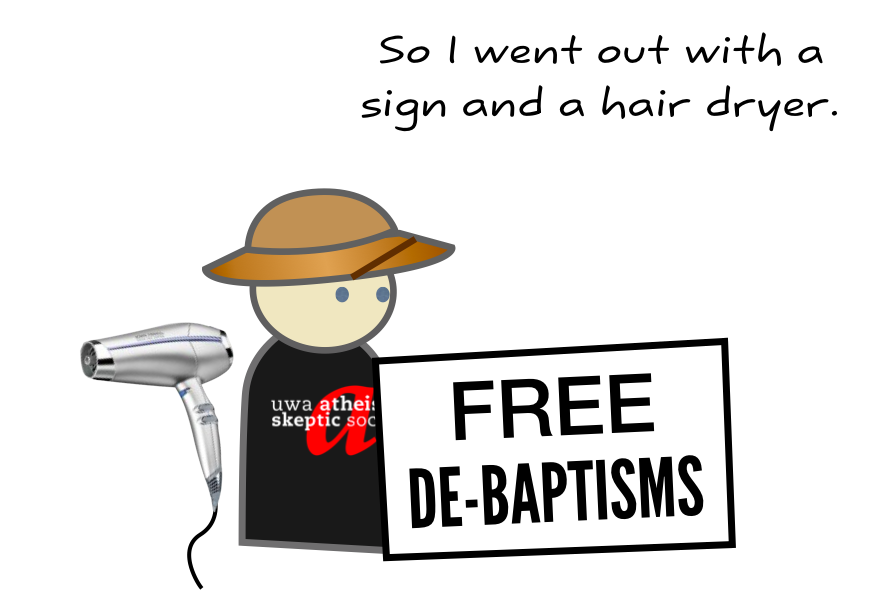
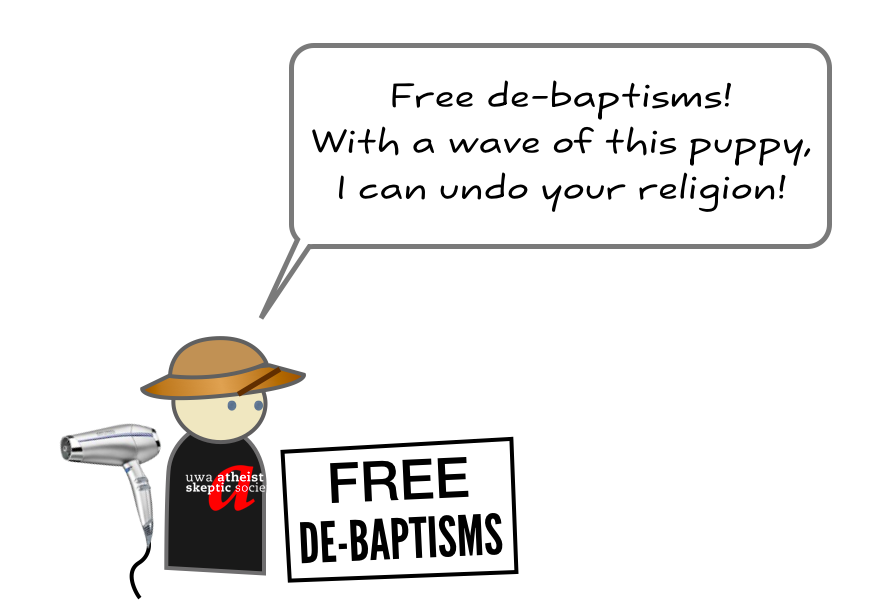

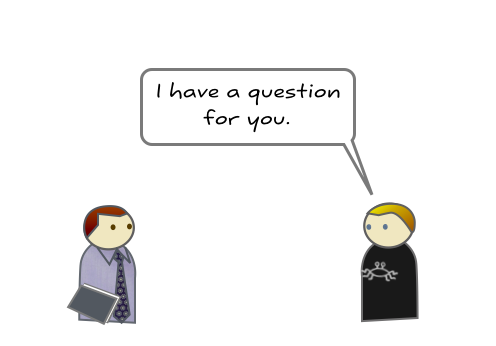

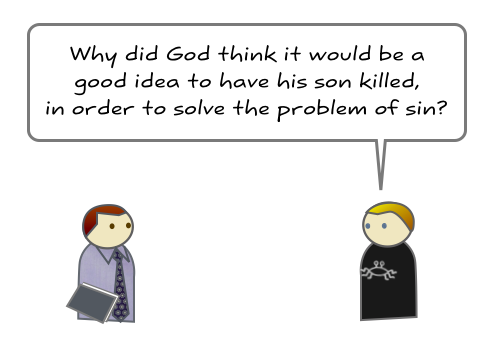
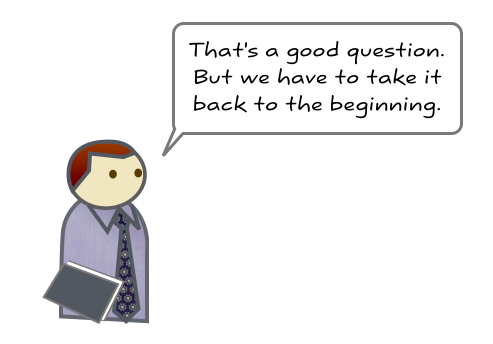
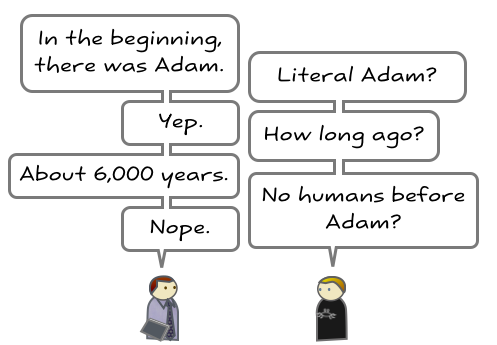
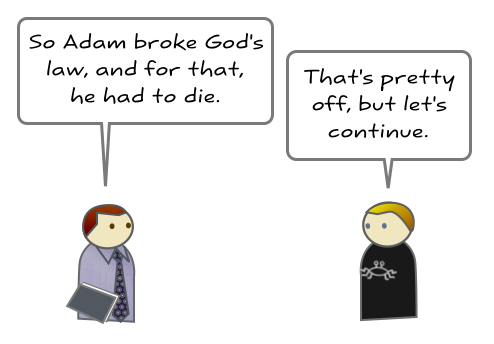
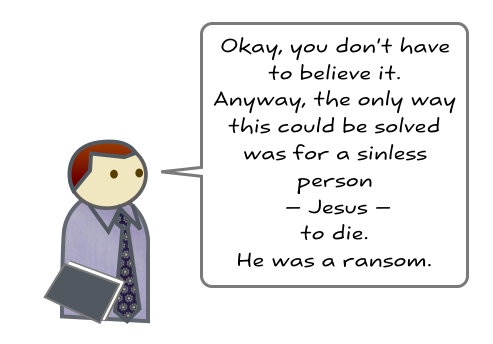
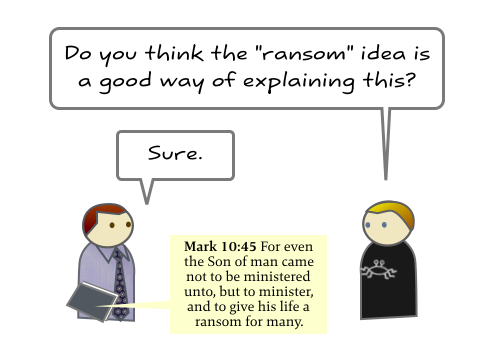
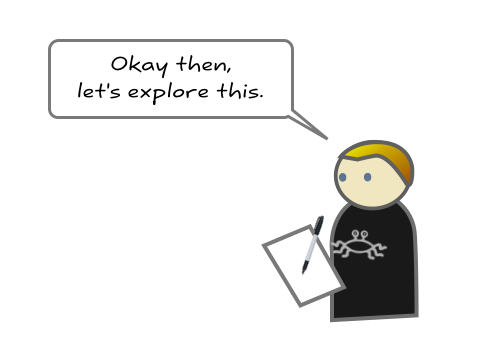
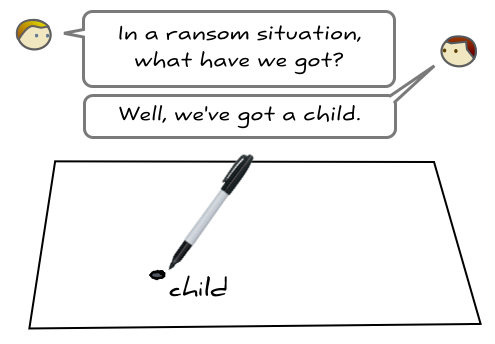
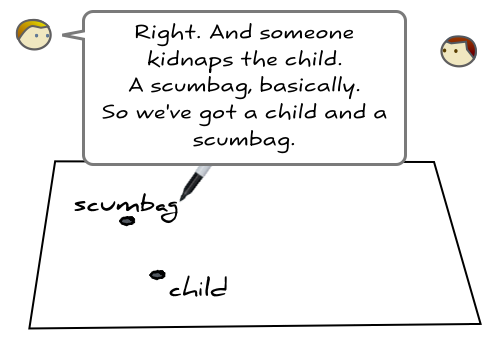
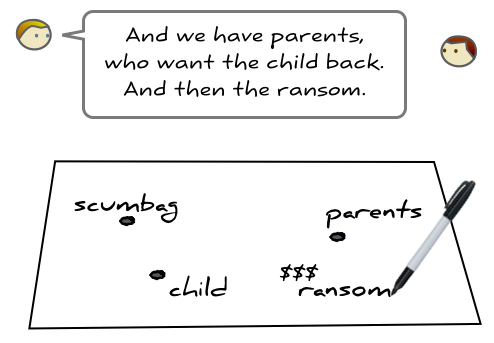
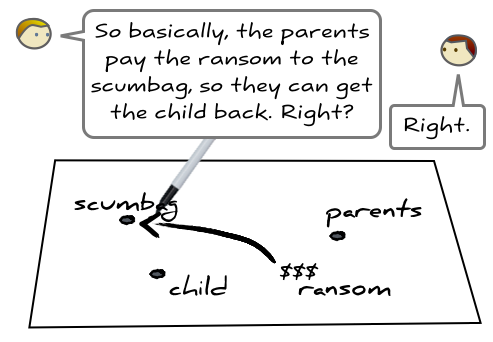
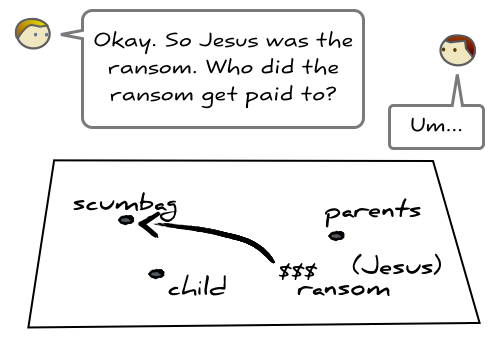
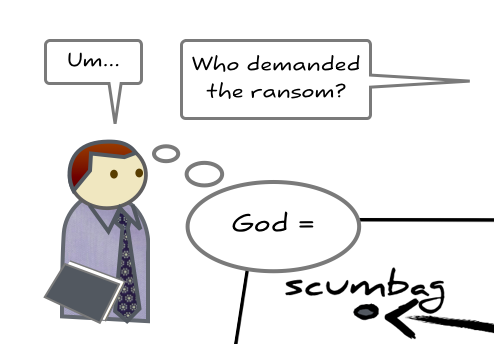
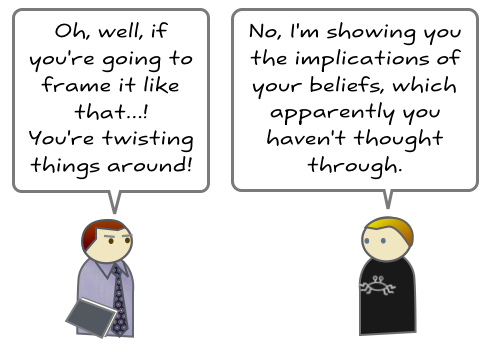
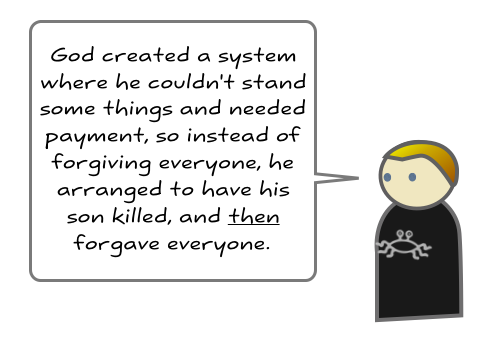
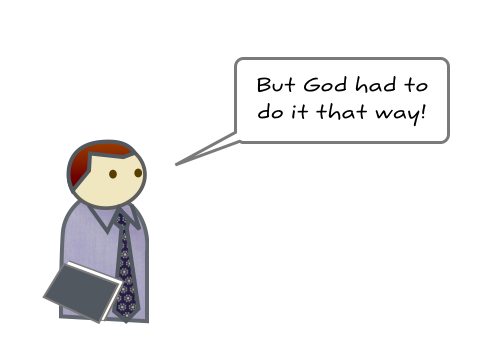
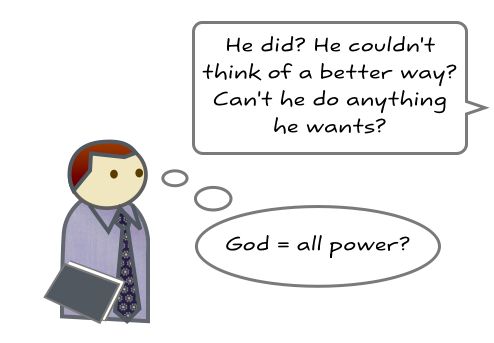
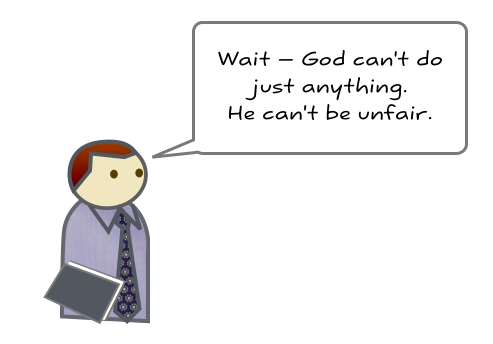
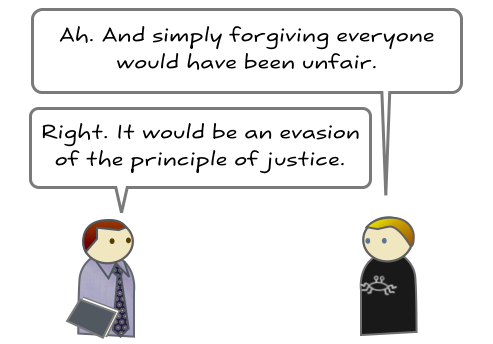
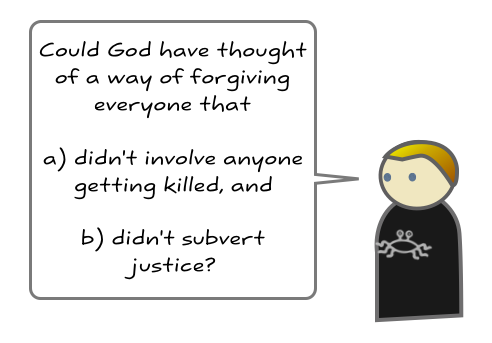
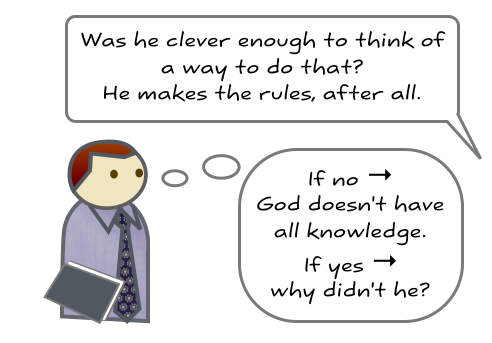
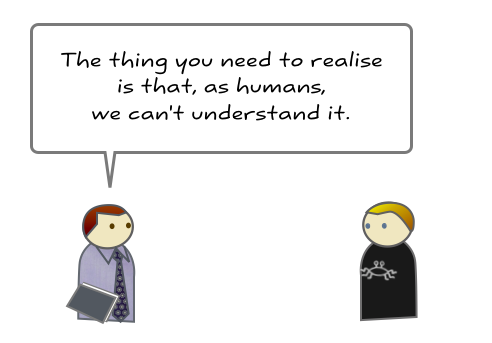
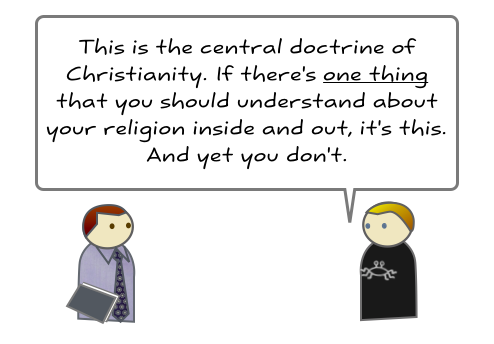
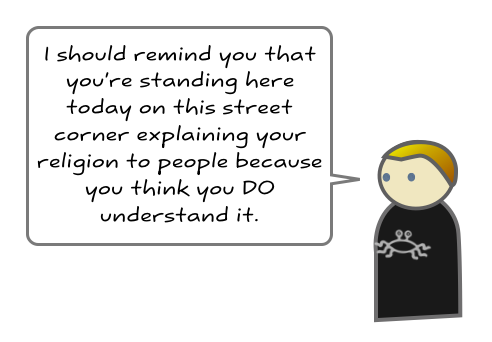
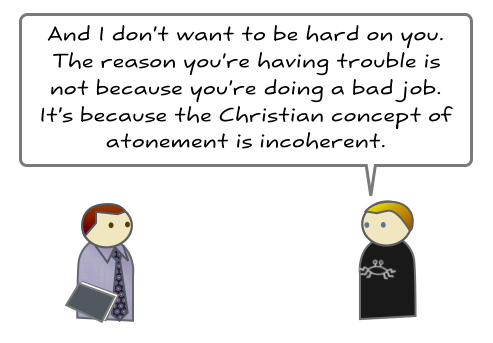
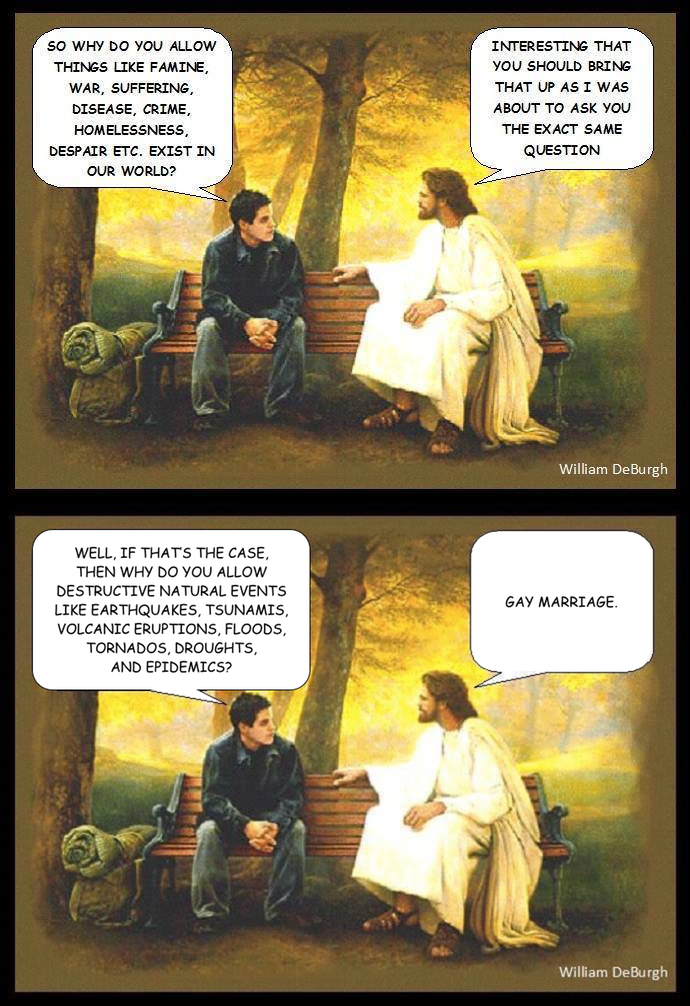


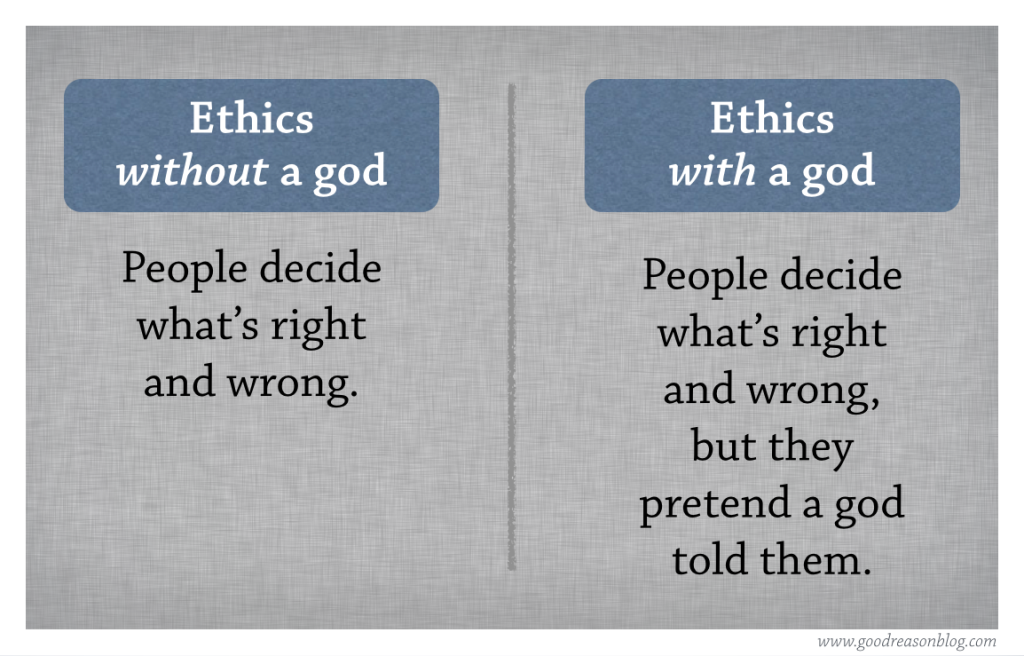


Recent Comments